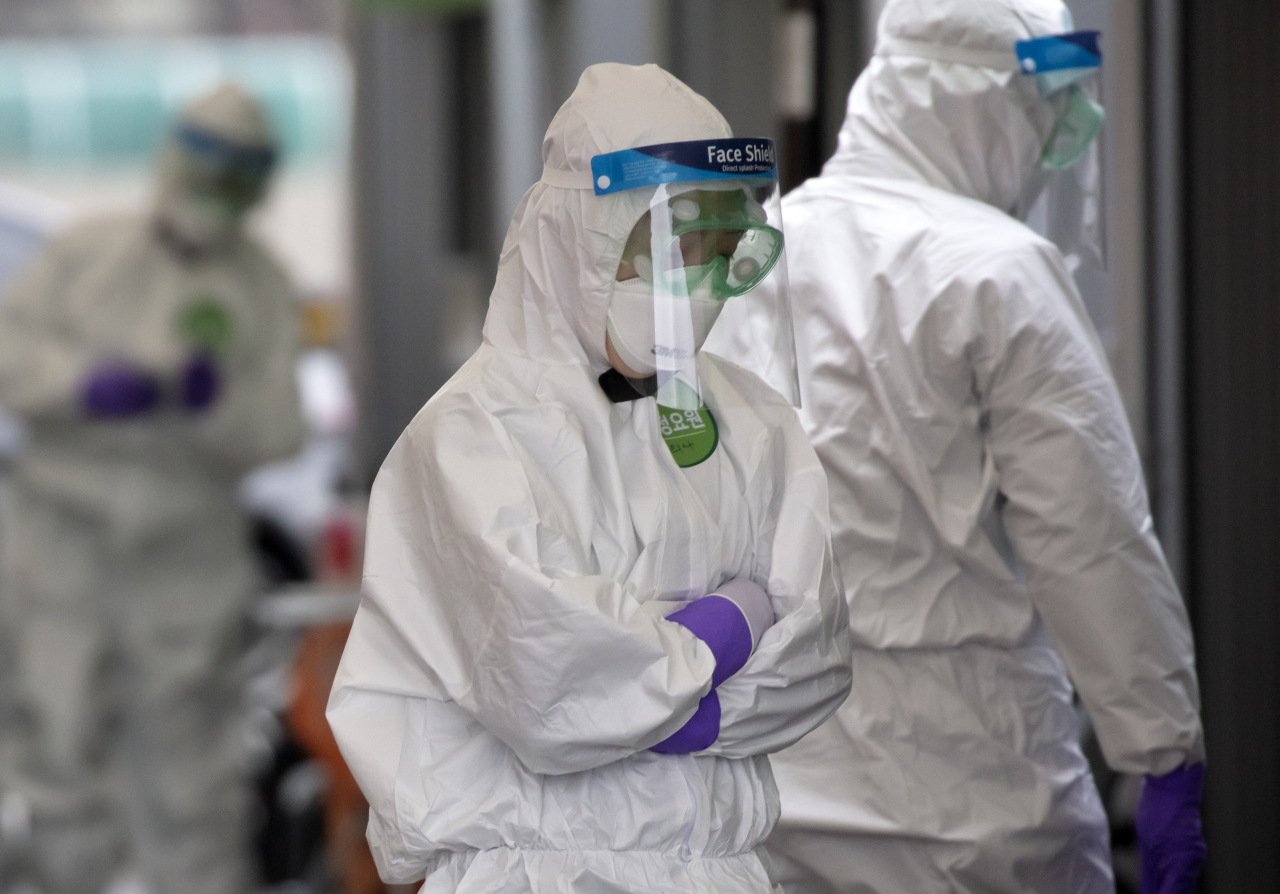Seoul’s biggest-yet cluster of infections emerged Tuesday, keeping South Korea’s health authorities on their toes despite the number of newly discovered infections across the country slowing for the fourth consecutive day.
The nationwide total of reported coronavirus cases rose by 131 to 7,513 with 54 deaths, marking the lowest daily increase in two weeks, according to data tallied Monday at midnight by the Korea Centers for Disease Control and Prevention.
The new cluster in Seoul involves at least 64 people, including employees at a call center in southwestern Seoul and their families, Seoul Mayor Park Won-soon said Tuesday, with an investigation into how the patients contracted the virus still underway.
The number of confirmed cases linked to the call center on the 11th floor of the 19-story building in Guro-gu was feared to shoot up, given that some 207 employees and trainees on the floor were being tested for the virus as of Tuesday afternoon.
Fears about community spread are also mounting, since the call center’s employees reside in different parts of Seoul and nearby cities -- at least 13 cases were confirmed in Incheon alone and 11 in Gyeonggi Province.
The location of the building -- which houses several call centers, wedding halls and offices, as well as 140 residences -- is also close to the capital’s public transport hub, Sindorim Station on Subway Lines Nos. 1 and 2, a popular transfer point for commuters from cities such as Anyang and Bucheon.
The government shut down the building for disinfection and was to expand an epidemiological inspection into residents on other floors of the building.
The packed working environment of the call center, where employees sit close to each other in confined spaces and constantly talk into phones, is believed to have facilitated the rapid transmission of the virus.
Korea, which reported daily increases of 500 or more last week, saw the rate at which new infections are discovered slow as health authorities had nearly completed checks on some 310,000 Shincheonji followers -- the group at the center of the rapid spread of the virus here.
Yet the government is on high alert as smaller-scale clusters of infections continue to emerge in the country’s most populated areas, Seoul and Gyeonggi Province, which could trigger a second or third wave of community transmission.
“The number of the total cases show a slowing trend, but we are concerned about cluster infection cases,” KCDC official Kwon Jun-wook said at a briefing Tuesday.
If cluster infections with no clear links to each other, albeit smaller in scale, occur in populated regions like Seoul and Gyeonggi Province, they could lead to an explosive increase in infections like with the Shincheonji Church of Jesus, he added.
The authorities said they were looking into possible links between the religious sect and other clusters of infections, including the call center in Guro district.
Some 80 percent of the country’s total cases have been linked to infection clusters, while for the other 20 percent the exact infection routes are still under scrutiny, according to the authorities.
Most of the cluster infections, or 63 percent, have been traced to a branch of an enigmatic religious sect called the Shincheonji Church of Jesus in Daegu.
Of the 131 new cases confirmed Tuesday across the country, 92 people were in Daegu and 10 in North Gyeongsang Province, which borders the city. The number of cases in the two areas represent 90 percent of the country’s total.
Eleven new cases were reported in Seoul, 11 in Gyeonggi Province, four in Incheon and two each in Sejong and South Chungcheong Province, according to the data.
So far, 54 people, mostly in their 60s or older with underlying illnesses, have died from COVID-19, with the overall fatality rate at 0.7 percent. The current fatality rate stands at 4.2 percent for those in their 70s and 6.8 percent for those in their 80s.
A total of 80 people were in serious or critical condition, according to the KCDC.
A total of 7,212 people are in quarantine, while 247 people have been released after making full recoveries.
The number of people being tested for the virus stood at 18,452. The country has so far tested a total of 202,631 people, with 184,179 testing negative as of Monday midnight.
By Ock Hyun-ju (
laeticia.ock@heraldcorp.com)







![[Today’s K-pop] Blackpink’s Jennie, Lisa invited to Coachella as solo acts](http://res.heraldm.com/phpwas/restmb_idxmake.php?idx=644&simg=/content/image/2024/11/21/20241121050099_0.jpg)
